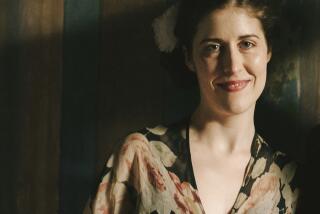Cloudy, chance of portent
- Share via
In his new novel, “The Great Perhaps,” Joe Meno blankets a Chicago family in whimsy. Jonathan Casper, paleontologist and father of two, suffers from a rare form of epilepsy that causes him to have a seizure whenever he sees a cloud, and is obsessed with proving the existence of a prehistoric giant squid. His wife, Madeline, is an avian behaviorist, mystified by the violence exhibited by some pigeons she’s using in her research. Their 17-year-old daughter, Amelia, is a fledgling revolutionary eager to thrust her politics on everyone she meets. To the chagrin of them all, Thisbe, the younger daughter, has found God. In a nursing home nearby, Jonathan’s elderly father Henry lies despondent, running through the painful events of his past and willing himself to disappear.
Recent years have seen a modest outbreak of this type of story, one that lets writers like Aimee Bender, Etgar Keret and Elizabeth Crane transparently indulge their imaginations and try to deepen our understanding of everyday life by distorting it. No dragons or unicorns here: These writers are more partial to human shape-shifters, tiny animals and black holes, darkly adorable sorts of things crafted to illuminate or at least allude to some sort of essential truth. When executed with restraint, these stories can be transcendent. Without it, they can become stagy and contrived.
Meno’s fourth novel, “The Boy Detective Fails” (2006), signaled his shift into this self-consciously twee territory. In this sweetly sad mystery, the characters were believable enough to justify its preciousness. But where his similarly inflected story collection “Bluebirds Used to Croon in the Choir” (2005) felt fresh and inventive, last year’s “Demons in the Spring” was more studied, most of its stories built precariously around the small grain of a novel idea: a woman with a miniature city growing, tumor-like, in her chest; a boy who is actually a firework. In “The Great Perhaps,” Meno leans even more heavily on gimmicks and sometimes seems unable to tell the difference between them and genuine emotion.
Meno’s best stories have been premised on the lively instability of youth; in particular, his 2004 novel, “Hairstyles of the Damned,” remains a vivid, compulsively readable portrait of disaffected adolescence. Here, he focuses on characters of several different ages, and the resulting portrayals are less precisely observed. His writing also displays a puzzling reluctance to let readers draw their own connections: As Madeline notes the behavioral patterns of her birds, she “wonders what this sort of thing might say about the world of human beings.” Jonathan studies “a creature who, like [him], favored the solitude of darkness to the unsafe spectacle of the clouds above.” Much of the dialogue is “whispered” rather than “said,” with fairly inconsequential bits of information presented matter-of-factly as “secrets.”
Quickly, the whimsy loses its pleasing, unpredictable fragility and starts looking calculated, with every character assigned a defining eccentricity. And many elements feel overwrought: Madeline finds that the male birds in her research have actually been raping the females before pecking them to death. Meanwhile, she becomes preoccupied with a “cloud figure” she sees hovering over the family house and drifting around Chicago and begins spending all day following it in her car. Thisbe’s newfound religiosity comes, unnecessarily, with brittle phobias and prejudices. Henry allots himself an ever-diminishing number of words to speak each day. Amelia builds a bomb.
As Jonathan and Madeline bicker and separate, and Thisbe and Amelia reckon with their own places in the world, the family proves that they share a common gutlessness. Their fixations are a way for them to mask their cowardice, a trait that would have more resonance had Meno dug deeper into the characters themselves. Henry is provided with the most intricate back story, but much of it reads like a tangent, the old man’s traumatic memories brought awkwardly to bear on the present. Though quite deliberately anchored in Chicago (where the author lives and teaches) and unfolding in the weeks leading up to the 2004 presidential election, there’s a decided lack of specificity that makes the Caspers difficult to envision and even more difficult to empathize with.
Furthering the sense that Meno is more invested in mood-setting than storytelling, he allows visual playfulness to overwhelm the words on the page, heaping on bolded sentences, italicized correspondence, historical interludes and occasional illustrations. The type of weighty clouds that plague Jonathan and intrigue Madeline have appeared elsewhere in Meno’s work: “Demons in the Spring” included a story about a woman who turned into a wisp of vapor whenever her husband kissed her. It was a bleakly tender, surprisingly subtle tale -- until Meno spelled out the metaphor on the final page: “Would I still love my wife so badly if she wasn’t so impossible to claim? Would I still want her if I could have her whenever I wanted?”
Despite its evocative title, in “The Great Perhaps,” Meno is similarly averse to leaving things open to interpretation. Cradling a paper flower in his hand near the end of the book, Jonathan realizes, “It’s beautiful because it’s complicated. . . . There’s not one thing that makes sense of everything.” The Caspers’ story might have been richer had it not been suffocated by blatancy -- in the absence of marine phantoms, homicidal pigeons and threatening weather patterns, the family is actually not so complicated.
More to Read
Sign up for our Book Club newsletter
Get the latest news, events and more from the Los Angeles Times Book Club, and help us get L.A. reading and talking.
You may occasionally receive promotional content from the Los Angeles Times.










